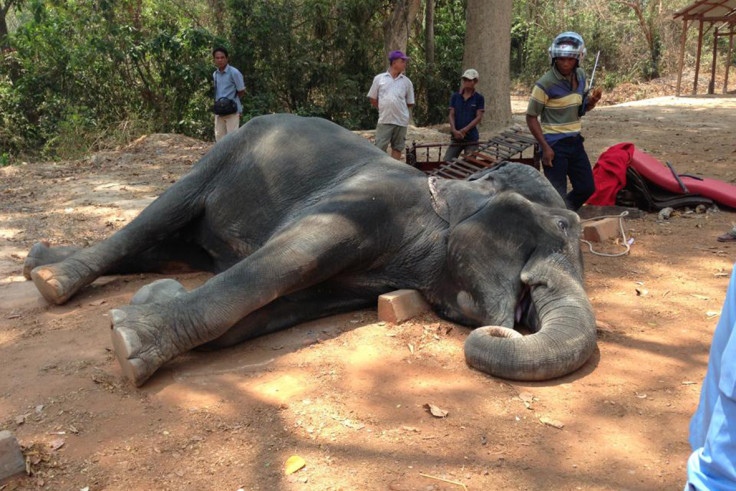Elephants are wild animals, not some gap year plaything for Western tourists

It's no surprise that one of the world's most remarkable animals are a major draw for holidaymakers in Asia. Unfortunately, many travellers intent on seeing these magnificent creatures opt to climb onto their backs – unaware of their pain and suffering.
This week Sambo the elephant collapsed and died of a heart attack after carrying tourists through the sweltering jungles of Cambodia. He was believed to have been between 40 and 45-years-old, and had been working since 2001.
It should be obvious, but riding an elephant is not the same as riding a horse. For elephants, all their wild instincts remain intact, even when born in captivity. Because elephants are wild animals, conditioning them to carry strangers as a tourist attraction every day often requires a process of "crushing".
Though there's nothing to suggest Sambo was subjected to this treatment, many other elephants are. It involves elephant calves being torn away from their mothers, confined to tiny wooden crates, and deprived of food, water and rest. Then trainers tie them down and beat them with nail-studded rods, all in an attempt to crush their spirit and prepare them for a life of servitude.
Once elephants raised in this environment are deemed sufficiently submissive, tourists are allowed to mount them while a handler, or mahout, controls their movements with a bullhook – a sharp metal weapon resembling a fireplace poker. Bullhooks are used to pull, prod and pierce sensitive parts of elephants' bodies in order to maintain the fear and obedience instilled in them during the crushing process.
Elephants who are forced to carry tourists around can be denied food and water for hours without breaks. In nature, elephants are very active and roam up to 30 miles a day, but when used in the tourist industry, they can spend most of their time shackled or carrying people.
In the wild, these highly emotional animals have complex social networks. Scientists have even told us elephants can cry, and experience grief. If you wonder how these sensitive beings keep from going mad when chained and beaten for years, the answer is – they don't.
In fact, such treatment pushes some of these normally gentle giants to the breaking point. Despite mahouts' best attempts at maintaining constant control over them, elephants forced to act as mules are unpredictable and sometimes even kill – as was the case earlier this year when a Scottish man was trampled to death in front of his daughter during an elephant ride in Thailand.
His death was not an isolated incident. In 2014, another elephant in Thailand threw off a handler, crushed him to death, and ran into the jungle with a Russian tourist and her daughter on his back. These fatalities are tragic, but they are the inevitable result of robbing highly intelligent, social beings of everything that is natural to them and treating them like props or toys.
According to World Animal Protection, over half a million wild animals currently suffer at tourist attractions around the world. There is clearly much work still to be done to raise awareness of their existence and shut them down. Tigers used in tourist photos in places like Thailand, for example, are often violently beaten into submission, drugged, mutilated by forcibly removing their claws and restrained in an effort to make them "safe" around the public. Nevertheless, numerous mauling incidents are reported every year when people attempt to get "up close and personal" with these wild beasts.
Swimming with captive dolphins is equally cruel. In the wild, dolphins swim more than 60 miles a day in a natural environment rich in marine life. But captive dolphins are separated from their families and confined to small tanks.
If you're someone who has been elephant trekking, had your photo taken with a big cat or swum with captive dolphins, you may say that in your defence, you didn't know the animals were being treated badly. But it's time to stop pleading ignorance and stop perpetuating these cruel attractions with our wallets. Instead, we can choose one of the countless humane activities available in every part of the world, such as going to a national park to see animals living free in their natural homes. In doing so, we can return home from our holidays with great memories – and a clear conscience.
Mimi Bekhechi is Peta UK's director.
© Copyright IBTimes 2024. All rights reserved.























